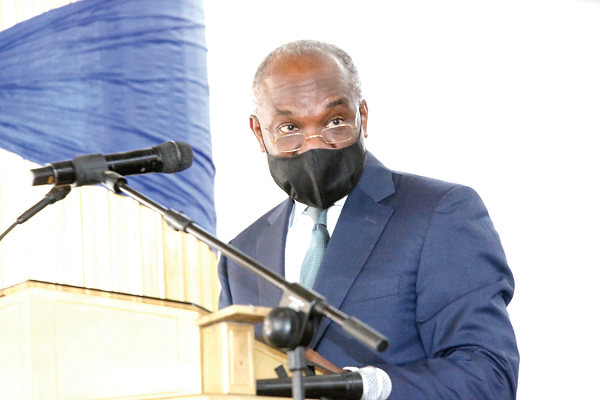
We need global collaboration, cooperation to contain COVID-19 — Dr Asamoah-Baah
The Presidential Coordinator of the government’s coronavirus response programme, Dr Anarfi Asamoah-Baah, has said the best way to contain the virus is to intensify global collaboration and cooperation.
“The global response so far has been national; countries closing their borders, hoarding medical supplies, buying vaccines in advance, sometimes even more than what they need.
Advertisement
“What this tells us is that national self-interest and internationalism are two sides of the same coin; being selfless and being selfish are the two sides of the coin,” he said.
Dr Asamoah-Baah, who is a former Deputy Director-General of the World Health Organisation (WHO), said this at the opening session of the 72nd annual New Year School and Conference at the University of Ghana, Legon in Accra yesterday.
The two-day conference, a flagship programme of the School of Continuing and Distance Education, College of Education of the university, is on the theme: “Building Ghana in the face of global health crises”.
Implications
Dr Asamoah-Baah said the implications of the current global approach to the pandemic was that, while Ghana could not insulate itself from the rest of the world, “our development depends on relying on and growing our own institutions, people, scientists, universities, civil societies, think tanks, media and the private sector”.
He said the fact that most research work was done by universities, while many civil society organisations were largely funded by external partners, made the country vulnerable.
“We need to invest in our institutions and our people. When I talk about investment, it’s not about money but appreciating, acknowledging, recognising and applauding our institutions,” Dr Asamoah-Baah said.
He commended Parliament, as an institution, saying: “We need opportunities for public debate in order to build national consensus. I also wish to pay special tribute to those who conceived the idea of the New Year School and those who continue to make it happen.”
Lessons learnt
Dr Asamoah-Baah said one of the key lessons COVID-19 had taught the world was that unless the house help and the driver were protected, the master was not protected, adding: “Unless everyone is protected, no one is protected, hence the importance of universal health coverage, good health for all and not for some.”
He stressed the need to empower the media in health literacy, saying if the media had to play their advocacy role effectively, they should be supported, “otherwise we should not blame them when they focus on controversy and officialdom bash”.
The coordinator further said the emergence of the COVID-19 was an opportunity for Ghana to change its concept and approach to health by investing more in the sector, adding that human, animal and environmental health was closely linked and should, therefore, be viewed as one of the same coin.
Depression
On mental health, Dr Asamoah-Baah said depression had become common among the youth because of stress.
He also said the use of the mobile phone was becoming an issue, and that many people could not stay without their mobile phones, to the extent that when their phones were away from them, they began to develop withdrawal symptoms.
He cautioned that if care was not taken, “we will pay a price”.
He also expressed worry over the use of mobile phones by children and said the phenomenon was leading to hearing loss among kids, warning that if the practice was not stopped, a time would come when “our children will have ears but cannot hear”.
On food sufficiency, he said the recent investment in food production in the country had paid off.
Dr Asamoah-Baah, however, said the growing taste for foreign food was undermining Ghana’s food security and, therefore, urged the people to “eat what we grow”.
Significance
The Vice-Chancellor of the university, Professor Ebenezer Oduro Owusu, said throughout its 72-year existence, the new year school and conference had served as a barometer for driving public opinion for the promotion of good governance and the socio-economic development of the country.
The Chancellor of the university, Mrs Mary Chinery-Hesse, also said the COVID-19 pandemic had completely changed the world and affected all aspects of life.
She said its negative impact on the economy was evident, and that the government could rely on the outcome of the conference to get some guidance as to how the economy could be energised “as we ponder life beyond COVID-19”.



